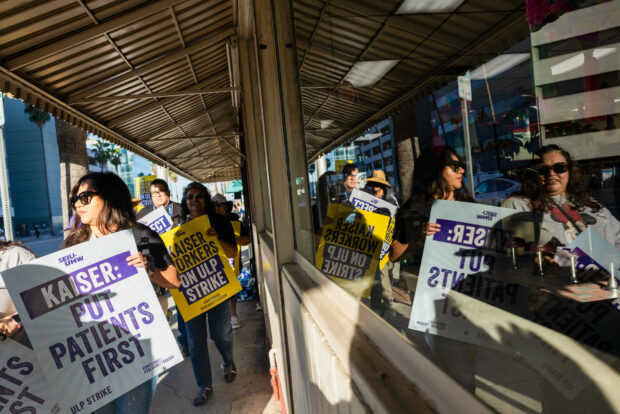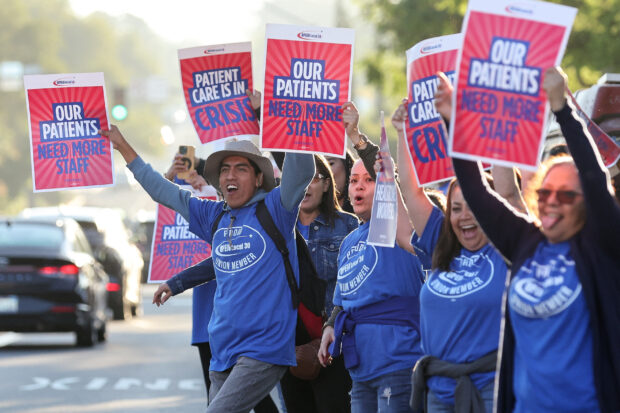US healthcare workers launch three-day strike at Kaiser Permanente

Healthcare workers strike in front of Kaiser Permanente Los Angeles Medical Center, as more than 75,000 Kaiser Permanente healthcare workers go on strike from October 4 to 7 across the United States, in Los Angeles, California, U.S. October 4, 2023. REUTERS/Aude Guerrucci
WASHINGTON — About 75,000 healthcare workers launched a planned three-day strike at Kaiser Permanente facilities across the U.S. on Wednesday, the largest-ever such action in the healthcare sector.
Those walking off the job include nurses, medical technicians and other support staff at hundreds of hospitals in California, Oregon, Washington, Colorado, Virginia and Washington D.C. Kaiser said hospitals and emergency departments would remain open, staffed by doctors, managers and “contingency workers.”
The coalition of unions representing the workers say the company, one of the nation’s leading not-for-profit healthcare networks and managed-care organizations, has failed to address an ongoing staffing crunch that has left workers feeling overworked and underpaid.
At the moment, this strike is only a three-day action. Both the company and the union said negotiations are continuing after the previous contract expired on Sept. 30.
“Kaiser executives can end this strike today if they would just bargain in good faith with frontline healthcare workers and end the Kaiser short staffing crisis, and that’s for the safety of our patients and for healthcare workers,” said Christina Andersen, a phlebotomist for 12 years at Kaiser Permanente’s Indian Hill clinic in Claremont, California.
Labor unions across the United States have grown bolder in their demands in the last two years, pressing for higher wages and better benefits to combat their loss of spending power due to rising costs.

People hold placards, as a coalition of Kaiser Permanente Unions representing 75,000 healthcare workers at Kaiser Permanente start a three day strike across the United States over a new contract, in San Diego, California, U.S. October 4, 2023. REUTERS/Mike Blake
This is already the busiest year for strikes since 2019, and that could grow in coming days if hospitality workers in Las Vegas elect to take action against casinos, and if auto workers escalate their strike against Detroit’s big three automakers.
“For the health industry in particular, I think this signifies the unions’ resolve to get proper staffing,” said Michael LeRoy, professor of labor law at the University of Illinois Urbana-Champaign. “The reality is that we’re in a new era of higher strike activity.”
The largest number of workers involved in a major work stoppage in the healthcare sector was 53,000 in 2018, according to the U.S. Bureau of Labor Statistics,
The coalition, made up of eight unions representing nurses, technicians and support staff, insists Kaiser needs to hire 10,000 new healthcare workers to fill current vacancies.
“Another strike may be in the near future, but at this point we’re just focusing on the next three days,” said Andersen.
In Virginia and Washington, D.C., only optometrists and pharmacists are on strike, but the impact on patients in California, Colorado, Oregon, and part of southwestern Washington state would be more substantial, a Kaiser spokeswoman said on Tuesday.
“Both Kaiser Permanente management and coalition union representatives are still at the bargaining table, having worked through the night in an effort to reach an agreement,” Kaiser said in a statement Wednesday.
Kaiser nationwide employs 68,000 nurses and 213,000 technicians, clerical workers, and administrative staff, alongside its 24,000 doctors.
Nearly 309,700 workers have been involved in work stoppages through August this year, according to U.S. Bureau of Labor Statistics data.